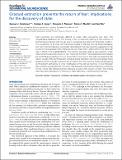Gradual extinction prevents the return of fear: implications for the discovery of state
Author(s)
Gershman, Samuel J.; Jones, Carolyn E.; Norman, Kenneth A.; Monfils, Marie-H.; Niv, Yael
DownloadGershman-2013-Gradual extinction p.pdf (965.0Kb)
PUBLISHER_POLICY
Publisher Policy
Article is made available in accordance with the publisher's policy and may be subject to US copyright law. Please refer to the publisher's site for terms of use.
Terms of use
Metadata
Show full item recordAbstract
Fear memories are notoriously difficult to erase, often recovering over time. The longstanding explanation for this finding is that, in extinction training, a new memory is formed that competes with the old one for expression but does not otherwise modify it. This explanation is at odds with traditional models of learning such as Rescorla-Wagner and reinforcement learning. A possible reconciliation that was recently suggested is that extinction training leads to the inference of a new state that is different from the state that was in effect in the original training. This solution, however, raises a new question: under what conditions are new states, or new memories formed? Theoretical accounts implicate persistent large prediction errors in this process. As a test of this idea, we reasoned that careful design of the reinforcement schedule during extinction training could reduce these prediction errors enough to prevent the formation of a new memory, while still decreasing reinforcement sufficiently to drive modification of the old fear memory. In two Pavlovian fear-conditioning experiments, we show that gradually reducing the frequency of aversive stimuli, rather than eliminating them abruptly, prevents the recovery of fear. This finding has important implications for theories of state discovery in reinforcement learning.
Date issued
2013-11Department
Massachusetts Institute of Technology. Department of Brain and Cognitive SciencesJournal
Frontiers in Behavioral Neuroscience
Publisher
Frontiers Research Foundation
Citation
Gershman, Samuel J., Carolyn E. Jones, Kenneth A. Norman, Marie-H. Monfils, and Yael Niv. “Gradual Extinction Prevents the Return of Fear: Implications for the Discovery of State.” Front. Behav. Neurosci. 7 (2013).
Version: Final published version
ISSN
1662-5153